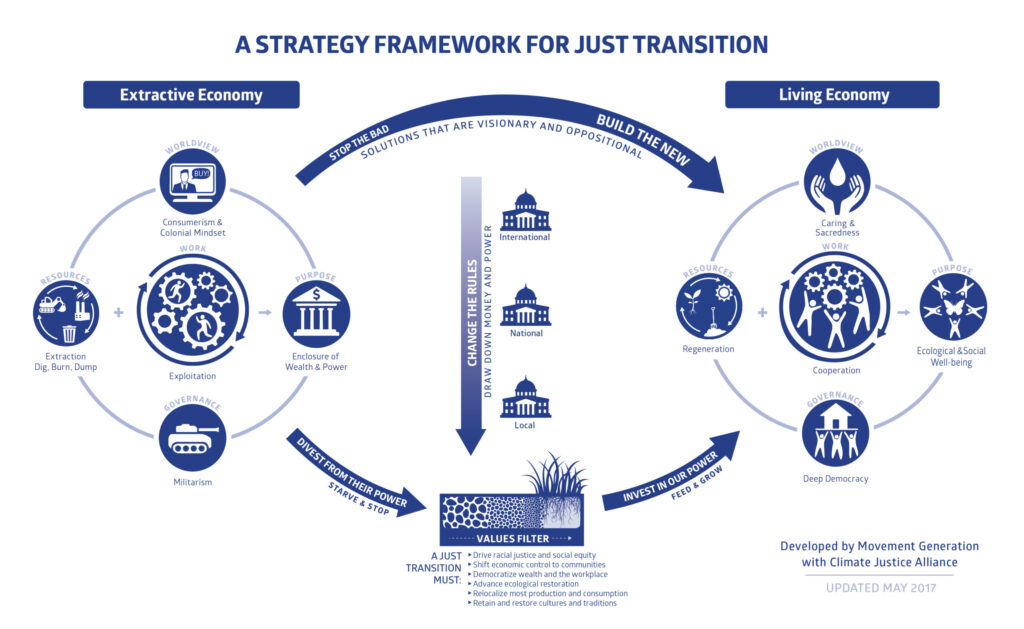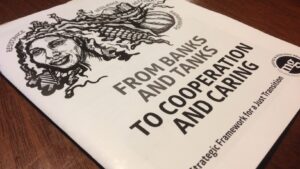Calling Up Justice uses the Just Transition framework in much of it’s work. We highly recommend these resources from Movement Generation. They offer this framework as a humble point of departure for folks interested in building collective vision and action towards Ecological Justice that does not separate humans from nature, or social equity from ecological integrity. For more on Just Transition framework and strategies from MG and others: Read MG’s Just Transition Zine; Visit Climate Justice Alliance’s webpage on Just Transition and
check out their Just Transition Framework Adaptations page that showcases powerful adaptations of Just Transition framework by different communities in various languages, creative formats, and sector-specific lenses.
Just Transition is a vision-led, unifying and place-based set of principles, processes, and practices that build economic and political power to shift from an extractive economy to a regenerative economy. After centuries of global plunder, the profit-driven, growth-dependent, industrial economy – rooted in the myth of white supremacy, heteropatriarchy, consumerism, and ableism – is severely undermining the life support systems of the planet. An economy based on extracting from a finite system faster than the capacity of the system to regenerate will eventually come to an end—either through collapse or through our intentional re-organization. Transition is inevitable. Justice is not.
Just Transition Principles
The transition will not be smooth or without conflict. But the time has come to organize ourselves towards predicting and provoking crises, rather than simply responding to those that are thrust upon us by the inevitable implosion of a death-dependent economic order. The following are a set of principles that, when aligned together, can help us craft strategic interventions to realize a Just Transition.
What We Feed Grows
If all we do is fight against what we don’t want, we learn to love the fight and have nothing left for our vision but longing. But longing isn’t good enough. We must live into the vision by creating it and defending it. We must “Build the New” as a way to “Stop the Bad” —we must be both visionary and oppositional. This doesn’t mean we don’t resist, but we have to organize ourselves into applying our labor to meet our needs rooted in our cultures and visions.
If It’s the Right Thing To Do, We Have Every Right To Do It
This is the principle that the basis of revolution is not simply a struggle for power; the basis of revolution is rights. It is when a people are organized enough to assert their rights, that the legitimacy of existing authority is tested. This includes asserting new rights, such as the Rights of Mother Earth. And the only way to assert rights is to exercise them. The only way to test whether we have the right to free speech is to exercise it. We can say that we have the right to housing, but it is only when we exercise that right and it butts up against the rules that infringe upon those rights in order to protect the enclosure of land do we challenge the legitimacy of existing authority to govern.
If We Are Not Prepared to Govern, We Are Not Prepared to Win
We must engage in the daily practice of self-governance, from our homes to the workplace to the statehouse. And we must not just govern under the existing structures; rather we must remake the shape of governance to be more democratic and ecologically responsive. This is how, when we organize to scale, we can perform civil disobedience at the scale of governance. We must make the rules we need. And break the rules that serve the rulers. And, ideally, we must make rules that break rules to assert deep democracy.
If It Is Not Soulful, It Is Not Strategic
Our vision nurtures our cultures, souls and spirits through song and ceremony, through practice and play. Our movements must be irresistible and rooted in the wisdom of our ancestries. We aim to create the culture that can hold us through both the best and hardest times—so that as we struggle, we do not need to seek respite via the trappings of consumerisms and the privileges of empire. This is how we heal from the crisis of disconnection. This is what it means to decolonize.
While the collapse of biological and cultural diversity is the crisis at hand, it is important to remember that we are not losing that diverse ecological knowledge and ancestral wisdom—we are lost from it. The knowledge resides in the relationship to soil, song and story. If we engage ourselves in the soil and our voices in the songs we will begin to find our way home. We will remember our way forward.


